13 High School Drama Activities To Get Them Going
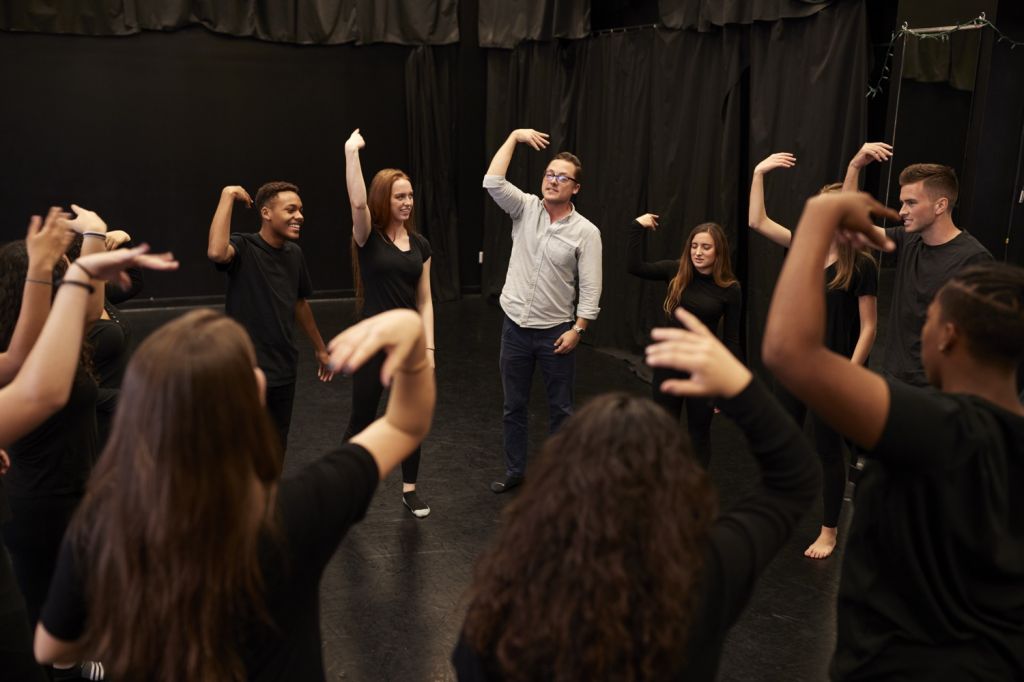
Teaching drama in high school can be challenging, or the most fun class you've ever taught. In this article, I'll go over 13 great drama activities for high school students, and tell you what I've learned from my own experience as a drama teacher.
So here are my 13 exercises to give a great high school drama lesson:

Collectively Counting to 20
Mirror sessions.
- Whoosh-Zap-Boing
Not All At Once
No empty spots, follow the leader, word associating, telling a story simultaneously, depicting a word, chair thief.
Below, I'll first go over a couple of quick tips for getting the most out of your lesson. After that, I'll explain each exercise one by one.
Good Exercise Combinations
- Games 1 - 4 are great warmups.
- Games 5 - 10 are good main activities because they are longer and go more in-depth.
- Games 11 - 13 are great to end the lesson on a high note. Also, it's a great way to release energy - which your coworkers will thank you for.
Here are some combinations of main exercises that work well in my experience:
- 5, 6, and 7
- 8, 9, and 10
For the opening and ending, you can choose games you like or fit the general mood of the classroom.
Things to Consider When Setting Up Your Lesson
I usually try to do four to five games for each one-hour lesson. But it really depends on the size of the group (larger groups = less games).
For some games, each player needs some time to perform their role. With larger groups, it can then take A LOT of time. So make sure to account for this. If the group is extremely large, you might want to avoid these games altogether.
For larger groups, you might want to consider planning to do only activities where the group performs as a whole.
What To Look For in Drama Activities for High Schoolers
We want activities that have some sort of friendly competitive element. Students may find it difficult to relax and give themselves to the game fully. Some form of competition will help them to get their minds off their homework, video game, or rap career.
In my experience, students can get preoccupied with how their peers perceive them. This can make it difficult for them to start playing around. To get them going, I suggest using some high-energy games with some friendly competition.
The right activities will help, but your own mood is also important. High school students will reflect your own mood and motivation.
Some Tips on How To Start Your Lesson
- High energy
- Make it physical
- Include everybody for the first activity - make sure everybody is on the floor
- Make it fun
The first activity will determine the energy and focus of the rest of the lesson. So make sure you pick something that fits your goal for that lesson. If you want to work on collaboration, pick something that strengthens teamwork, like Not All At Once .
You can also use the warm-up exercise to balance out the energy in the group. If they feel particularly hyperactive or unfocused, use a focus exercise, like Collectively Counting to 20 .
So let's dive into the exercises.
This first exercise is great to increase the students' focus. This is the right opener for you if you feel your students aren't particularly focused at the moment, or if your next exercise requires extra focus and you want to prepare them for it.
The players form an intimate circle, standing shoulder to shoulder. The players count in random order from 1 to 20. Whenever two players use the same number simultaneously, the game starts over.
Tip : the group will think up tricks for cheating. For example, a small cough beforehand. I found it helps to ask the students to close their eyes, or to make them look at the ground.
Once you get their attention with a solid warmup exercise, let's keep increasing focus. With this game, we want them to be attentive to each other. Increasing awareness can be difficult for high-schoolers. I found that by increasing their awareness, they will open up and become more playful and have more fun during class.
Two players are facing each other. Player A starts to move and player B mirrors player A's movements and facial expression as closely as possible.
- A pair in front of audience. They agree on who starts and who mirrors. Then they perform in front of their audience. The audience shouldn't be able to tell who mirrors and who initiates the movements. After the performance, the audience may guess the initiator.
- Both players can both initiate and mirror at the same time.
Knee Tag is a great high-pace exercise. It really helps to activate them, especially when energy is low. Suitable as a warmup and ending exercise.
Players position themselves facing each other. Everyone uses one hand to tag and one hand to defend. Players want to tag each others knees. With the defending hand, players may protect themselves to try to avoid getting tagged.
Please note: if you end with this game, your students will be hyperactive when leaving the classroom. So make sure the next class isn't maths.
Whoosh Zap Boing
This game teaches them to be spontaneous and gets them to stop thinking and simply start acting. That's why it's a great warmup.
If you teach this class regularly, this one is great to repeat every single time. After a couple of times, they become really good at it - which increases enjoyment and engagement.
All players are standing in a circle. The game leader picks who goes first. He or she passes a 'WHOOSH' (a sweeping motion with both arms) to another player. The players pass on the sound to the person beside them. It doesn't matter which way.
After this round, 'BOING' gets introduced. BOING is crossing both arms and facing the person passing the 'WHOOSH'. This stops 'WHOOSH' and will make it change direction.
Lastly, the game leader introduces 'ZAP'. You ZAP by forming a pistol with your hands, pointing it at someone and yelling ZAP! This makes the WHOOSH jump to the person being ZAPPED.
You want to play this game at high speed. If a player moves before they're up, or make a wrong move or sound, it's game over. Players that are out sit down on the floor.
At the end of the game, only two players will remain. The class will have to come up with their own way to determine the winner (ie. rock-paper-scissors).
This is the last warmup exercise. Now you've got their attention, energy is high and they are focused and playful. Let's take a look at some great main exercises, which will require more focus and engagement, which is why we started with these games.
Now, let's get our drama on.
The following exercises go a little bit more deeply into drama techniques. I like to spend the majority of the class on these exercises.
This exercise focuses on the group instead of the individual. Also, it requires them to pay close attention to each other, which means they will become more attentive.
One person walks. The rest of the group stands still. There needs to be one person that walks at all times. It's the group's responsibility to ensure this.
Whenever the Walker stops, someone else needs to start walking immediately. The transition needs to be seamless. Also, whenever someone starts walking, the Walker needs to stop walking immediately.
Teacher's tip
The group will quickly find its own rhythm. After a while, they will probably walk and pause for the same amount of time every time. So make sure they stay present and switch it up.
This next exercise is an excellent follow-up, because it ups the tempo, reducing the time to think. This exercise focuses more on the individual player as part of the group (instead of the entire group).
The players walk across the room quickly (but they don't run). At all times, they want to keep the same exact distance between them. At the same time, they try to fill up the space entirely.
Naturally, the players shouldn't touch each other. When a player discovers a 'hole', he or she tries to fill it.
Every now and then, the game leader shouts "stop!", at which point everybody stands still. The game leader then checks whether the room is filled evenly.
Ideally you want that the players form one liquid mass, that fills the room without stopping, agile, and at an even pace.
Spicing It Up
Stop the group in the middle of a run, let them close their eyes, and ask them where a specific person stands in the room (make them point). This challenges them to be aware of their environment.
This is a main exercise that may require a bit more time. It can take a while for students to get the hang of it - so it's probably a good idea to allow them more time.
The group starts at their starting position. One of the players then starts a motion. The rest of the group mirrors the motion.
There is no fixed group leader. It's a dynamic role. Whoever starts the motion, becomes the temporary leader.
Ideally, the group and leader move as one. If the exercise is performed perfectly, you shouldn't be able to tell the leader from the group.
To Spice Things Up
After doing this exercise collectively, it's great fun to split up the group and let one half of the group watch the other half play the game. Make sure to discuss it afterward.
What will happen is the audience will see a narrative develop. Which is funny, because it's just a series of made-up movements.
This will teach them that on stage, everything gets a meaning attributed - whether you want to or not. So it matters what you do there.
If your students are prone to overthinking, this is a great game. It helps them to relax the mind and start to play.
All players are standing in a circle. The teacher says a word, and the person to the teacher's left immediately responds with a new word, based on their own association. After that, the next player responds with his or her word.
You only associate on the last word mentioned. Ideally, you don't think of anything in advance, and every word is stated spontaneously.
High schoolers can be notoriously selfish. I like this exercise because it teaches them the opposite. It's a great way to learn that not everything is about YOU. The group is valuable as well.
Two players both tell a different story to the audience. They tell it simultaneously. Afterward, you test both narrators by asking them to tell the other's story as if it were his or her own. You will find that both narrators are practically unable to retell each other's stories.
In round 2, the game leader asks two new players to tell a story simultaneously. This time, the game leader will pause the first story and start the next, then pause the second and start the first. Please note that they shouldn't react to each other's stories. They should only tell their own.
In round 3, the narrating pair determines when to pause their story themselves.
Ideally, you want the narrator to remain aware of the other narrator while telling his or her story.
High school students can find it extremely important how others perceive them. This exercise teaches them to let go control, and surprise yourself (by acting a little crazy).
Player A says a word. Without thinking, Player B and Player C quickly depict the word. The depiction can be either concrete or abstract - literally or figuratively. Player A claps his or her hands whenever he or she thinks the image is complete. Player B and Player C relax (at ease) and wait for Player A's next word.
The goal of this exercise is to loosen up the students. I've found that whenever they are able to let go, and not be afraid of what others might think, all of a sudden they start having A LOT of fun.
The next three games are great endings for your lesson.
This first end game is great for boosting self-esteem and positivity.
Everyone is standing in a large circle. One by one, a volunteer steps into the circle. He or she does or says something that takes at least five seconds. In response, the rest of the group applauds fiercely - regardless of what the volunteer did or said. The volunteer steps back into line, and the next one enters.
It can feel awkward at first, but give it a try. After a couple of rounds, people will stop wondering what the heck they are doing and start to feel great after their round of applause.
Teenagers can have low self-esteem, and especially drama lessons can be quite intense and demanding. So this exercise ends on unconditional positive note. It's also a great warmup. Ending your class this way will help them to remind it as positive instead of challenging.
This game is so much fun because it engages everybody every single time. It's my absolute favorite.
I like this game the best:
- it challenges them to act out / visualize without overthinking it
- activates a lot of game fun, humor, laughter
- it introduces them, in a very playful manner, to who, what, where
Who What Where is basic drama theory. Who are the roles - the relation, who is this about? What is the problem that needs to be solved or object. This is what fuels the scene. Where is the location - where does the scene unfold?
Of the team, three people go outside the classroom. The last person remains in the classroom (this is player 1). The class collectively thinks up the following (the game leader decides):
- a murderer (a profession or famous person)
- the murder weapon (arbitrary item)
- the location (specific spot)
The game leader starts the stopwatch. Player 1 collects player 2 from the corridor. He or she portrays the murderer, murder weapon and location. Player 2 then collects player 3 and portrays all three points. Player 3 then collects player 4 and portrays who, what and where. Player 4 in turn rapports to the group who was the murderer, what was the murder weapon, and where the crime was commited.
The team that's the fastest and with most correct answers wins.
Quick tip from experience: pick a person, an item and a location that are easily portrayed.
My other personal favorite.
Very high energy game. Because of the time pressure, the students are really engaged and generally have a lot of fun playing this. They also have to collaborate in order for it to work. I find that they always start collaborating at one point - it kind of forces them to do so.
All players sit on a chair, scattered throughout the room. There is one empty chair.
Player A gets appointed as the Chair Thief and stands at the opposite end of the room. Player A's goal is to sit on a chair. However, Player A may only walk slowly.
The group wants to prevent Player A from sitting on the empty chair. Contrary to Player A, they are allowed to run.
Whenever Player A walks towards the empty chair, they quickly switch chairs, leaving a new empty chair somewhere else in the room.
In Conclusion
Now you know 13 great exercises to get your high school students going. Pick the ones you like or think will fit your group. Feel free to adapt, change and adjust. After all, you are the teacher, and you know your group best.
One last tip: always keep one trump game up your sleeve, in case one of the games you've picked doesn't work out after all.

You Might Also Like

17 Proven Drama Exercises for Building Confidence
Improve your lessons.
If you like our content you can subscribe to our DramaTips newsletter. I don't like spam. Currently, I'm not sending out newsletters.
Tish Becker
Thanks for the info/exercises…I start teaching drama in September at a high school that has been teaching theatre from a book and calling it drama - I want to bring a ton of energy in hopes of recruiting a lot of students to join the performing club. Would welcome any other advice!
Leave a comment
Your email address will not be published. Required fields are marked *
To help you find just what you need, I've sorted these lessons in a few different ways:
- DRAMA FROM PICTURE BOOKS: A collection of ideas for using a picture book to start a Drama activity. Listed first here because the ideas vary widely as to appropriate age level.
- HAND ANIMALS: A first character game. For first-time drama students.
- NURSERY RHYME CHARADES: A pantomime guessing game about nursery rhymes. For Pre-Kindergarten and up.
- A TREE GROWS: A narrative pantomime about an apple tree growing from a seed. For Elementary and younger.
- PAINTING THE BOX: A narrative pantomime about personal space and visualizing colors.
- PAINTING THE MUSIC: A narrative pantomime about emotion and drama in music and paint.
- RAINFOREST LESSONS: A small collection of lessons and lesson variations about the rainforest. For Pre-Kindergarten and up.
- NO, YOU CAN'T TAKE ME!: A fun game that requires critical thinking skills. For Elementary students.
- THE LION KING'S COURT: A role-playing game about friendship and animals. (Nothing to do with the Disney film.) For Elementary students.
- SEASONS AND WEATHER: An activity that teaches younger children about seasons and weather or that can be used with older students as an improvisation game. For Elementary and older.
- COMING TOGETHER: A narrative pantomime about space and visualizing space, and about community and friendships. For Elementary and older.
- THANKSGIVING FEAST: A narrative pantomime about using our senses and the First Thanksgiving. For Kindergarten and up.
- SAINT GEORGE AND THE DRAGON: A pantomime project based on the famous story. Teaches analytical thinking skills and body awareness. For Kindergarten and up.
- RHYME CHARADES: A game of rhymes and pantomime. For Kindergarten and up.
- AROUND THE WORLD IN THIRTY MINUTES: An imaginary journey that teaches geography and cultures. For Elementary students.
- BEN FRANKLIN'S INVENTIONS: A physical creativity game. For Elementary students.
- SCULPTURE GALLERY: A game of posing and creating, which allows students to see the creative process from the inside and the outside. For Elementary and older.
- MIRROR MIRROR: A collection of mirroring exercises. For all ages.
- PUPPETS IN THE DRAMA CLASSROOM: A collection of puppet-making and puppetry projects.
- GUIDED IMAGERY: Sensory awareness, imagination, story-making and concentration all are enhanced by this meditation-like activity. For around 3d grade to adult.
- EMOTION WALK: A big lesson about movement, body language, and the ability to consciously control our movements and the impressions we make with them. For older Elementary through adult.
- THREE LESSONS ABOUT ENERGY: Three lessons designed around a third-grade science unit on energy and the three states of matter. For Elementary students.
- THE JEFFREY GAME: A movement game of building on one anothers' ideas. For older Elementary through adult.
- MUSICAL FREEZE IMPROVS: An improvisation game of creative movement. For all students.
- GROUP STORY PROJECT: A big project. Guides a class to cooperatively write their own original story. Can be used to generate a story for the Group Playwriting Project. For Elementary students.
- GROUP PLAYWRITING PROJECT: Another big project. Guides a class to cooperatively write their own play from an existing story. For older Elementary students.
- NEWS PLAYS: Supports Social Studies, History, or Current Events curricula. Involves improvisation, group planning, and performance. For older Elementary students.
- OREGON TRAIL PROPAGANDA: Supports a Social Studies unit about the Oregon Trail. Examines the nature of propaganda, as well as the nature of advertising in today's world. For older Elementary students.
- FOURTH-GRADE PLAY: This is not really a lesson plan. It is a narrative description of the entire project, which took several months, by which my fourth-graders and I wrote and produced a play about the Oregon Trail. For older Elementary and up.
- SOCIAL ROLES: A pantomime guessing game that teaches the idea of social roles within any society, and supports a Social Studies curriculum in world cultures. For older Elementary students.
- GIBBERISH SENTENCES: A pantomime game that explores ways to communicate without words. Can be used as a primer to more elaborate Theatre Games, or to support a Social Studies curriculum about immigrants. For older Elementary and up.
- THE DISCOVERY OF FIRE: An improvised scene about early humans. For older Elementary and up.
- RITUALS: Students create their own magical rituals while exploring the importance of ritual to early (and modern) cultures. For older Elementary and up.
- PAPER MASKS: A lesson using masks to teach body language. Can be related to a Social Studies unit on Greek Theatre. For older Elementary and up.
- EDWENA'S GAMES: The first of what I hope will be many pages of games and lessons from other teachers. A collection of concentration, warm-up and improvisation games from a friend.
- THREE WORDS: A pantomime and improvisation exercise. For older Theatre students
- MAKE YOUR OWN GREEK PLAY: An exercise designed to teach concepts about Classical Greek drama in a hands-on way. For older Middle School and up.
- INSTANT JOURNEYS: A fun and fast-paced improvisation and teamwork game. For Middle School and up.
- STORY STORY: A fun improvisation, storytelling and pantomime game. For Middle School and up.
- I AM WALKING--INSTANT VERSION: A game of cooperation and communication. For Middle School and up.
- JOB INTERVIEW : A wacky concentration game that makes you think on your feet. For older Theatre students.
- CIRCLE OF CHARACTERS: A complex and challenging game of characters and observation. For older Theatre students.
- HANGMAN CHARADES: Just for fun. For Middle School and up.
- CONCEPT CHARADES: A challenging game of improvisation and creativity . For Advanced Middle School and up.
- WHAT WOULD YOU DO?: An exercise for helping young actors more fully inhabit their characters. For Middle School and up.
- SLOW MOTION WALK: A writing exercise, really. Great for getting over writer's block. For Middle School and up.
- IMPROVS AND WARMUPS: A collection of warmup exercises and improvisation games collected from various places. For older Theatre students.
- Narrative Pantomime Stories: These are lessons that involve Narrative Pantomime--a technique in which the teacher or leader tells a story and each student, usually working independently, "acts out" the story.
- Physical and Pantomime Activities: These activities all teach physical control and pantomime communication.
- Improvisation Activities: Virtually all Creative Drama involves improvisation, but these plans focus in part on building improvisation skills.
- Role Drama Activities: These lessons use the technique known as Role Drama, in which students are in role and must make choices and relate to each other in role.
- Writing Activities: These lessons focus on the writing process.
- Lesson Collections: Though listed normally on other lists, these are actually collections of related lessons, rather than individual lessons.
Back to top of page.
Everything you need to teach design with our award winning resources!

- Sep 24, 2020
Six Engaging Starter Activities for Classroom Drama
The start of the lesson is prime learning time, when students can be the most receptive and concentration levels can be high, so harnessing this is crucial. However, with many drama lessons taking place in classrooms at the moment, what are the best starters to use, which are both engaging and purposeful, without being labour intensive?

An ex-colleague used to refer to the starter activity as the 'buy in' and, as a young teacher, I definitely focused too much on making the start of the lesson 'exciting' as opposed to thinking about the learning taking place. I now know that there are many ways to start a lesson which are engaging and not labour intensive, and don't rely on copious amounts of technology. I have six of these to share with you, with some specific ideas about how they can be used in the drama classroom and have compiled these Six Engaging Starter Activities for the Classroom Drama in a handy prompt sheet, which you can download and print at the bottom of the post.
Planning your Starter Activities
Those first few minutes are crucial in terms of engaging a class and getting them off to the best start. A starter can be engaging if it includes the following:
Competitiveness
A sense of fun
A desire to find out or complete an answer
Collaboration or
An element of surprise
When planning lessons and schemes of work, ask yourself- " what is the purpose of the starter? " This should be connected to your lesson objectives. For example, is the purpose of the starter to:
Prepare for new learning or a new topic?
To revisit and practice important skills?
Consolidate knowledge from & make connections with previous lessons?
Assist memorisation?
Or be surprising and fun?
Effective and engaging starter activities can be planned as a sequence of discreet units to build knowledge, understanding and motivation over a series of lessons. In drama, a good example of this is if you want to teach key terminology over several lessons or develop the essential knowledge and understanding around a specific text at GCSE or A-Level before exploring it practically. Ultimately, starter activities need to challenge students and therefore need to demand both pace and thinking in order to engage, so aim to make starters both active and thought-provoking.
Planning Starter Activities
" If we begin the lesson with a well-chosen recap, we are activating that prior knowledge, and making it much more likely they will be able to understand any new concepts being introduced " Jo Facer, Simplicity Rules , p.62
Former English Teacher, now Headteacher, Jo Facer dedicates a chapter of her book Simplicity Rules to 'Starting a Lesson' and offers several effective but time-efficient strategies which can be adapted for the drama classroom. She suggests that, when planning a unit or scheme of work you need to have a "really clear and organised idea of what the specific things are in your subject that you want your pupils to remember for the long term" (p.62). She also says suggests to ask questions with short or one-word answers so they can be done rapidly. You only want to be spending the first 5-10 minutes of the lesson maximum on these recap, starter activities.
I suggest you create twenty questions when you are planning a scheme of work, which link to the essential knowledge for the particular unit and then spread them out as starter activities throughout the unit, ensuring that you revisit each question several times. Remember, that "it is reckoned that children need to be expose to a new idea at least four times for it to stick." (Facer, p.6) These are low stakes questions and you should have the expectation that many of the students in your class should get 100% in each of these starter activities. This starts each lesson positively for the whole class and increases confidence for students of all abilities.

Six Engaging Starters for the Drama Classroom
I've put together a prompt sheet for you to download and print off with the six key ideas from this BLOG! It is available for free in my free Resource Library. These are time-saving, versatile and engaging lesson starter ideas for the drama classroom, which can be incorporated into schemes of work or can be planned in under ten minutes immediately before a lesson. All the activities can be simply projected as a task on a PowerPoint slide on the board, for students to complete immediately as they enter the room. You may also want to include a countdown timer showing how long they have for completing the task. When the timer has finished, ask for a 'hands up' to see who has X number of answers, in order to get a feel for how high you have pitched the level of difficulty for your task or questions. You can then decide to give students time in pairs to discuss their responses, prior to whole class feedback. Facer suggests that students mark it themselves, in a different coloured pen and "go over it rapidly" so you can get into the main activity of the lesson (p.65). To get a sense of which questions students have struggled with, ask for hands for questions they got wrong. This is important for future planning of lesson content and recap questions. So here are the six starters:
Starter 1: Three to five questions from the previous lesson's learning, with one word or short answers
This is a really simple starter, which takes very little time to prepare and answers can be checked verbally within the first five minutes of the lesson. For A-Level I find these questions are great for checking student knowledge relating to the context of a particular text or practitioner. Here are some examples:
Example from a Key Stage 3 Stage Spaces SOW
1. Name the stage space with the audience on two sides.
2. What is the name of the End on Stage space popular in the late eighteenth century?
3. What is alternative name for a thrust stage space?
4. Sketch an aerial view of a theatre-in-the-round, with the audience clearly labelled.
Example from an A-Level SOW on Our Country's Good (AQA)
1. Who wrote The Recruiting Officer and in what year?
2. Briefly describe the Workshop process which informed Wertenbaker’s writing of the play.
3. List three ways in which Ralph Clarke changes as a result of directing the play.
Starter 2: Three to five answers from the last lesson- Students write down the questions
This is an alternative approach to the first activity and can lead to wider discussion and debate. This is because there are multiple questions which could be written with a one-word answer or phrase. For example, if the answer was 'the transformational power of theatre', in relation to Our Country's Good , this could lead to a discussion around how this theme is conveyed in the play, or perhaps why Wertenbaker chose to explore this theme in the wider political context of the 1980s. For this reason, I find this activity works particularly well with A-Level and GCSE students, studying a set text.
Starter 3: Open-ended questions to plan or think- e.g. "What if..../ How might you..."
You are looking for more reflective, personal responses here, as well as checking knowledge and understanding. If GCSE and A-Level students are creating devised work or preparing to perform, you could ask questions such as:
What if you were to add a moment of ___________ to your performance piece?
What if you were a set designer, creating a set for a theatre-in-the-round?
How might you apply Brechtian techniques to this particular scene?
How might you use Stanislavski's objectives to explore this scene practically?
These questions might lead onto students writing a diary rehearsal log, in preparation for developing portfolio work or might lead into group discussions for practical devising. It also works well when students are preparing production concepts for set texts at GCSE & A-Level.
Starter 4: One minute to mind map keywords related to a topic, text or area of study

This works well as a starter for online learning, as students can then visually share their ideas once completed.
This is an example of a Key Stage 3 One Minute Mind Map recapping 'Performance Skills' terminology.
Starter 5: Find three quotes from a play text
This is an effective revision tool, especially when students are starting to think about the textual evidence they are going to use for an essay question at GCSE or A-Level. I would make this quite focused and ask them to select quotes from a specific section or scene. This is also a great way to recap the scene you have studied or explored in the previous lesson before moving on.
For example:
quotes which relate to the theme of......
quotes which relate to specific area of context.
quotes which reveal a character's personality trait or mood.
Starter 6: Provide students with a new or unfamiliar concept or keyword. Students decide which definition is correct.
This creates curiosity, intrigue and discussion around a new concept or topic. Simply write the word or phrase on the board and ask students to write down or discuss which definition or definitions they think are correct and why. This may also involve identifying the definition which is incorrect. For example:
An artistic movement which started in literature and then moved into drama.
It was pioneered by the practitioner Bertolt Brecht
It was concerned reproducing real life on stage.
So there we have it- six effective and engaging starters for the drama classroom. I hope this has given you some time-saving ideas for starters. The activities suggested in this article need not be limited to only the start of the lesson of course. They can also be used at the end of lessons too, as plenaries or can also be used to check knowledge in blocks of longer lessons. You can download & print our prompt sheet of all six starter activities (which is really handy to keep on your desk) by filling out the box below and gaining access to the We Teach Drama Resource Library :
Facer, Jo 2019, Simplicity Rules: How Simplifying what we do in the classroom can benefit children . Routledge
#lessonplanning #starteractivities #outstandinglessons #classroomdrama #retrievalpractice #schemesofwork #simplicityrules #teacherworkload #promptsheet #freeteachingresources #plenaries #planningschemesofwork #lessonobjectives #effectivestarters #timesavingstarters
Recent Posts
#SeizetheDay! Give Drama the recognition it deserves.
Winner Announced for Outstanding Scheme of Learning
Winner Announced for Outstanding Model Box
Comentarios


STORYTELLING
Worksheet activities.
SUITABLE FOR ACTING, MUSICAL THEATRE AND SPEECH AND DRAMA

Effective storytelling connects to the meaning of anything you perform, giving your audience something to really relate to. This activity sheet will help you develop your storytelling skills on your own, with your family or even with your friends on a video call. There are lots of options, so you can split the tasks up and try them over a few days.
LEARNING OBJECTIVES OF THE SESSION
- warm up the articulators
- use the voice effectively
- create stories
- be imaginative in storytelling
- connect storytelling and characterisation vocally and physically
- be more confident in telling stories and speaking aloud
WARM UP EXERCISES AND ACTIVITIES
(10 minutes)
There are lots of simple exercises here to warm up your voice and body. If you haven’t been physically active today then you can use them to get you going and increase your energy. It’s a good opportunity to get your whole family involved.
Try them all and then concentrate on the ones you enjoy and then you can build your own warm up from this menu.
FACE, TONGUE & JAW
- Stick your tongue in and out 6 times to stretch the tongue.
- Smile and pout x 6.
- Circle your tongue slowly 4 times right 4 times left with mouth closed.
- Chew an imaginary piece of toffee. Use all your jaw and imagine what it tastes and feels like.
- Have a little laugh to yourself to think about opening the vocal folds.
- Laugh out loud with control, use the whole face, then silently whilst thinking about how it feels.
- Scrunch up your face tight, then open with mouth open saying ahhhh! Scrunch close, open ahhhh.
- Breathing in for 4 counts and out for 8 counts. Keep shoulders relaxed and feel the breath down into the abdominals.
- Breathe in for 4 and out for 8 counting aloud, 12345678.
- Any variation on this to start to feel the breath filling the lungs without tension and breathing out with control. Imagine you have a balloon in your abdominals and when you breathe in the balloon expands and when you breathe out it deflates.
VOCAL - VOWELS
Working through the following vowels sounds add a physical action and send it back and forth to your partner. Ee Ay Ah Oh Oo Aw i.e Eeeeeeeeee with an arm(s) action (circle or similar).
PING-PONG CONSONANTS
- Using consonants each person choosing a consonant to strengthen articulation i.e. Person 1 - PppppppppppP Person 2 – BbbbbbbbbbbB Person 1 - TttttttttttttttttT Stress is on the first and last letter and this is done until you run out of consonants. Pace is key and have fun with it.
- Try adding a consonant to the vowel sound and change the consonant i.e Mee, May, Mah, Maw, Moh, Moo Tee, Tay, Tah, Taw, Toh, Too.
TONGUE TWISTERS
- Say the tongue twisters slowly at first to get used to them and then quickly up to 6 times in succession. a. Red Lorry, Yellow Lorry b. Red Feather, Yellow Feather c. She sells seas shells on the seashore d. Unique New York e. Peter Piper Picked a Peck of Pickled Peppers.
- Why not write your own tongue twister…then teach it to each other?
- Try saying a tongue twister with emotion, sad, happy, excited…you decide.
- Try to say the tongue twisters quietly, then loudly.
- Have a competition with each other and see how many times you can say the tongue twister with clear diction and breath control.
Check the space for hazards and make sure there are no vases you can accidentally break before you start.
- Put your right ear to right shoulder and roll your chin down and forward until to the left ear meets the left shoulder. Roll back the other way x 3.
- Shrug your shoulders up, down, then roll them forward and backward.
- Swing your arms in a circle in one direction, then the other, then in opposite directions - one forward and one backwards (this one takes some concentration!)
- Do some star jumps to get your whole body going x 6
- Roll your body down to the floor with your arms out stretched and then back up again very slowly. It’s a good idea to softly bend your knees to avoid injury unless you’re super flexible!
- Shake everything out to release any last bits of tension in your body.
EMOTION, CONCENTRATION AND FOCUS ACTIVITIES
(5 minutes)
Choose one of these each time you do the worksheet.
THE TELEVISION GAME
In pairs, choose one person to lead the game and pretend they have the remote control for the television. Ask the other person to visualise the television. It is up to the person with the remote control to change what’s on the screen i.e. it is a scary film, a happy programme, a funny cartoon and the reaction changes with each change of emotion or imaginative image.
CONVERSATIONS
Using either fruit, vegetables or favourite foods have a conversation using a range of emotions and only the words i.e. apples, bananas...happy, sad excited. Each participant chooses a different word which means this could be extended to ‘I love apples’ with a response of ‘I hate apples’. The natural extension of this is ‘Why do you love/ hate apples/bananas’.
TELL ME ABOUT...
- Your favourite book, holiday, food, to a time limit - 30 seconds.
- Thee fun facts about yourself. Make sure you introduce who you are first i.e My name is...and I'm...(age) - time limit 60 seconds.
STORYTELLING (MAIN ACTIVITY)
(15-20 minutes)
This is the main focus of the worksheet and these activities can be repeated and split over several days or sessions. It's a good opportunity for you to reflect on how things are going and what you want to change or do differently. Once you are confident with an activity then you can show your performances to family and friends – in person or over a video call.
1. TRADITIONAL STORIES
Using a traditional fairy story such as the story of The Three Little Pigs , narrate the story reading it aloud but also acting it out. The more fun you make this the better. The actions can be done by both participants and this will support learning both vocally and physically. Start to think about how the pigs are portrayed? What characteristics do they have? What does the wolf look and sound like? What do the houses look like?
2. BUILD A STORY
Each participant starts a story with one word at a time i.e. Person 1. Once/ One Person 2. upon / day Person 1. a/as Person 2.time/ I
The aim is to build a story very simply and quickly, thinking about how the story is made exciting or fun and the type of characters you might introduce? As the activity becomes easier to do you might decide to be the narrator (He/She) voice or first person (I). The possibilities are endless.
3. STORYBOX
1. Make a box of words and use them to cre- ate stories without preparation, whatever comes out of the box should form the basis of the story. Have fun at challenging each other with this and add a time limit. You have 1 minute starting now...
2. Write your stories down and act out the story.
3. You should think about who you are in the story and how you are showing the charac- ter, mood and meaning.
4. Record your stories on a phone...they might be useful to use in your mime scenarios.
5. Try to perform the story as the narrator or the characters, changing voices.
6. When you’re happy with your story – show it to your family and get some feedback from them.
Make the stories simple as you develop your storytelling skills, then try them in different ways. Try to be the narrator or tell the story from one of the characters in the story perspective.
RECORDING PROGRESS
Write down your answers to the following:
- What have I learnt today?
- What did I do well today?
- What do I want to improve for the next session?
- What did I enjoy and why did I enjoy it?
- How will I improve what I did today?
- I will do this by...(date)
Then get your parent or guardian to sign it. If you keep that going over a few days, before you know it, you will have started a drama workbook which charts your progress.
Access Trinity Anthology online for poems, stories, monologues and a whole host of resources to support your independent sessions.

- International
- Topical and themed
- Early years
- Special needs
- Schools directory
- Resources Jobs Schools directory News Search
Cover lessons for secondary drama
Australia and new zealand, international schools, tes resources team.

Take the stress out of preparing your cover lessons with this range of drama resources
Whether you need lesson cover as you're rehearsing a production or absent from school, we've made preparing cover work easier with this selection of lesson ideas, activities and worksheets. Explore everything from easy to follow guidance for non-specialists on one-off practical drama activities to do in a drama studio, to lesson ideas and worksheets for when the students will be in a classroom.
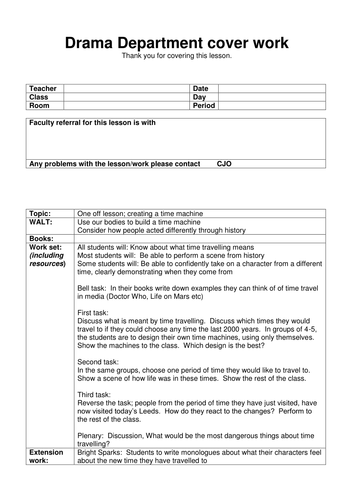
Cover/one off lessons of Drama

Drama KS3 / 4 one-off cover lesson script task
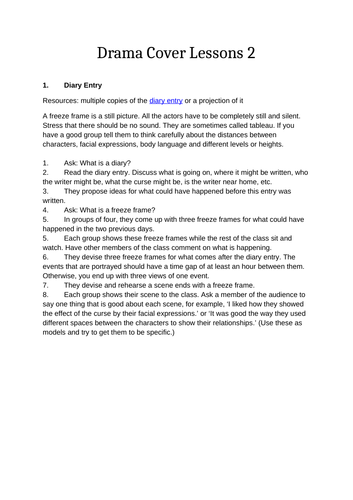
Drama Lessons for Cover or Supply Teachers 2
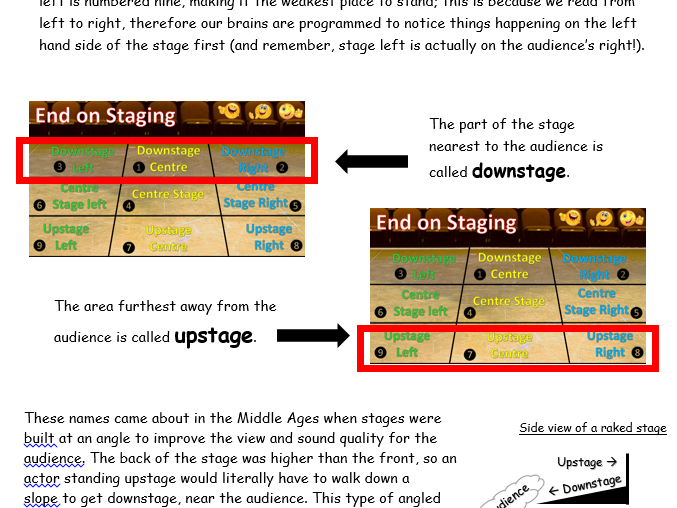
KS3 Drama Cover Worksheet on Staging
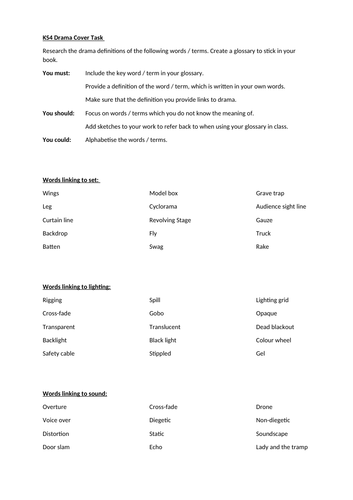
Drama Cover Work for KS4

Drama Cover lesson ABC

Drama cover work: Character creation
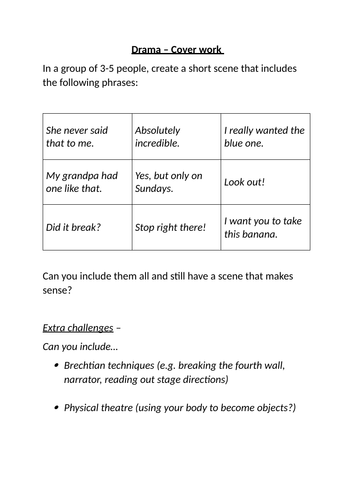
Drama - Cover Lesson (ideal for non-specialists!)

Complete Drama KS3
Selina norgrove, a complete scheme of work.
Although Drama is recognised as one of the most popular arts subjects, resources to support teachers are hard to find, particularly for KS3.
Complete Drama KS3 combines the reassurance and convenience of printed materials with the engaging nature of digital resources. It aims to support teachers, improve learning and save whole departments time with planning, resource preparation, homework and assessment.
A wealth of material
The resource contains six projects each for Years 7, 8 and 9 – a total of 18 fully resourced units of work. Each one includes seven lesson plans, complete with resources, extension tasks and homework suggestions. In addition, the material can be searched by drama technique, vocabulary or key area.
Meeting the requirements
Complete Drama KS3 addresses all aspects of the subject, according to the Arts Council England’s Drama in Schools: Second edition guidance on Drama at secondary level and the Key Stage 3 Drama objectives bank .
For the student
Resources in Complete Drama are provided for the three key areas of:
- Making (exploring, devising, shaping, interpreting)
- Performing (presenting and producing)
- Responding (evaluating and applying knowledge and understanding).
The activities are aimed at KS3 and the resource forms ideal preparation for KS4/GCSE. Over 1700 pages of material are provided, including homework tasks.
For the teacher
This resource offers experienced teachers, as well as non-specialists, a full KS3 curriculum, covering all the areas necessary to teach Years 7 to 9. Full guidance on using the student material is included, as well as lesson plans and activity outlines to support your teaching. In addition, resources are provided to help with the following:
- The school improvement plan
- Designing a policy on Drama in non-arts subjects
- Developing curriculum maps, preparing schemes of work and lesson plans
- Clear lesson and homework resources
- Offering differentiation in the Drama curriculum
- Ensuring links with other departments and school bodies
- Inclusion of numeracy, literacy and ICT
- Accommodating different learning styles
Convenient format
All the material comes with a full network and copy licence. All the resources can be viewed/used onscreen or printed out.
Online discount
This item is eligible for a 10% discount if ordered through this Web site. The price shown is the full price; the discount will be automatically calculated when you place an order.
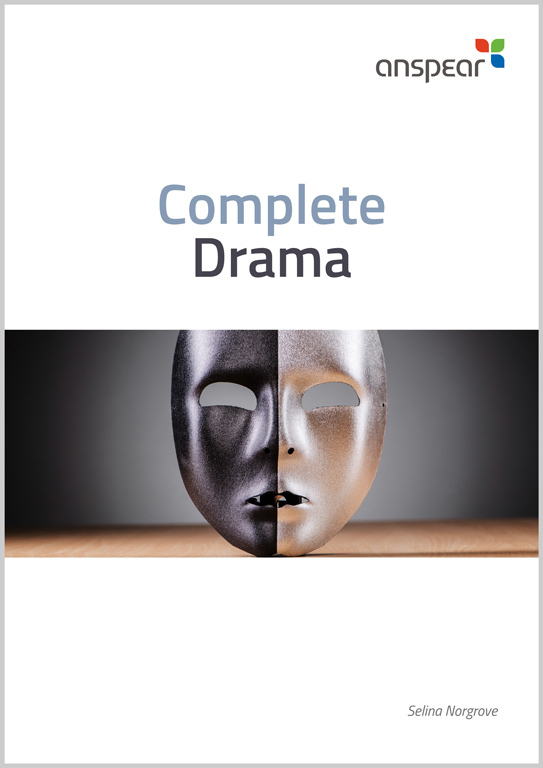
We have placed cookies on your computer to help make this website better. You can change your cookie settings at any time. Otherwise, we'll assume you're OK to continue.

IMAGES
VIDEO
COMMENTS
Are you teaching drama? Use this collection of drama games to help your theatre students feel more confident onstage. If you need more, inside of Drama Notebook, you will find a huge collection of well-organized drama lesson plans, royalty-free play scripts for kids and teens, and 50 drama activities on video.New material is added every month.
Yeh Shen - Homework Task 2: Knowledge and Understanding Questions Complete the sentences below. If you are unsure of any of the words, check the ... List all the Drama related activities you participate in during your spare time. You can also list any activities which develop skills you can use in Drama (e.g. Football - working in teams ...
18 pages of drama activities that can be done remotely. Over 50 drama lessons and 100 free links to video content online. ... Many of these activities can also be assigned as homework, or given to students who cannot be physically present in class, or given out as extra credit! The activities are organized by age level, starting with pre-k and ...
Sensory Games 10 great drama activities that allow students to tap into their senses so that they may later apply what they learned to their role in a play or performance. Subtext Games Ten fun ways to introduce the concept of subtext! 7 pages. Ages 10 and up. Wizard Drama Games 9 pages. Seven incredibly fun wizard-themed drama activities!
Games 1 - 4 are great warmups. Games 5 - 10 are good main activities because they are longer and go more in-depth. Games 11 - 13 are great to end the lesson on a high note. Also, it's a great way to release energy - which your coworkers will thank you for. Here are some combinations of main exercises that work well in my experience: 5, 6, and 7 ...
35 drama activities that help students warm-up their bodies, voices and imaginations, and build trust within the group. Drama Games to Teach Online. 45 drama games and improv activities for online learning. Socially Distanced Drama Warm-ups. 24 drama warm-ups that can be done while social distancing!
In the drama studio, there is a flexible performance space. Below are some diagrams of the most common performance spaces. Task: having looked at the diagrams, consider where the audience is sat and where the actors enter and exit. Think about what people can see when they are in the audience. Then complete the table on the next page, stating the
Improvisation Activities: Virtually all Creative Drama involves improvisation, but these plans focus in part on building improvisation skills. Role Drama Activities: These lessons use the technique known as Role Drama, in which students are in role and must make choices and relate to each other in role. Writing Activities: These lessons focus ...
Hundreds of high-quality drama lessons for elementary, middle school, and high school. Easily teach subjects such as beginning acting, improvisation, Shakespeare, pantomime, monologues, playwriting, theatre history, technical theatre and more! Find an Alphabetical List. of all Lesson Plans Here. New Lessons/Scripts. Introduction to Drama Notebook.
Primary Drama Workshop. Three CPD films and resources for non-specialist teachers, offering guidance on using curriculum-focused drama activities to the classroom. The films show teachers and ...
Spanish. Inside Drama Notebook, you will find a huge collection of well-organized lesson plans, scripts for kids, drama activities, 50 drama games on video and more! Join today and dramatically reduce your planning time while delivering fresh, innovative drama lessons to your students! If you are new to teaching drama, this site will be a Godsend!
BTEC in Performing Arts or The Drama GCSE, there is written work to do. This booklet is to be used to help you learn key Drama terminology and to help you develop your written work in Drama. You may also use this booklet for homework, so it's your job to keep it safe and clean. Drama Rules There are three main rules and they are very simple.
Drama games and activities allow students to have fun whilst growing in confidence and learning valuable theatrical skills. Within the structure of a Drama or English class, drama games can be used to focus students' attention, facilitate team building, deployed as a tool for developing communication and receptive skills, or simply to foster ...
3. List three ways in which Ralph Clarke changes as a result of directing the play. Starter 2: Three to five answers from the last lesson- Students write down the questions. This is an alternative approach to the first activity and can lead to wider discussion and debate.
Drama Home Learning Bundle. This is a bundle of Drama home learning resources that have been used with KS3 students - but could be easily adapted to KS4. There are 8 weeks of content - with each week giving students an option of tasks to select from. was £5.00. Report this resource to let us know if it violates our terms and conditions.
Stick your tongue in and out 6 times to stretch the tongue. Smile and pout x 6. Circle your tongue slowly 4 times right 4 times left with mouth closed. Chew an imaginary piece of toffee. Use all your jaw and imagine what it tastes and feels like. Have a little laugh to yourself to think about opening the vocal folds.
Drama, Theatre and Film Activities. 2 min. Updated: 1st February 2023. Here are some ideas of some activities you can try at home! Create a storyboard of the main events in your favourite film. Create a freeze-frame from a scene in your favourite film using toys and any other props you can find. Put on a play about a topic of your own choice ...
This involves students developing knowledge of Drama Practitioners. The students select a practitioner and complete a range of creative and research activities to develop their knowledge. There is also an opportunity for students to complete performance tasks. This task can be used to support distance learning, or as a homework.
This feeds forward to Year 8 'Melodrama and Naturalism', Year 9 'Curious Incident of the Dog in the Night-Time' and Component 2-Devising Drama at GCSE. UNIT INTENT Lesson Intent Vocabulary - Daily Retrieval/Teach for memory Activities/Assessment (to including the metacognitive/learning verb Homework/Literacy Map
Worksheet suitable for KS3 drama pupils. Ideal for cover work, homework or catch up work for pupils who have missed introductory lessons to proscenium arch and end on staging. ... Drama Cover Work for KS4 £ 1.00 (0) Research task appropriate for a cover lesson for high ability KS3 or for KS4 drama. A simple but beneficial task which pupils ...
follow-up homework activities Drama is by its very nature amenable to supporting a diverse range of students, including those with specialist educational needs. As students work in groups throughout all years of the course, staff can direct students to work alongside appropriate members of the group to support their individual learning.
HOMEWORK: DRAMA AND THEATRE STUDIES KEY STAGE 4 Amount of Homework For GCSE Drama and Theatre Studies a 30 minute homework is given each week or one hour per fortnight, depending on the task set. This will be taken in and marked. GCSE Homework Activities • Research projects • Learning Lines • Annotation of scripts • Character notes/profiles
For the student. Resources in Complete Drama are provided for the three key areas of: Responding (evaluating and applying knowledge and understanding). The activities are aimed at KS3 and the resource forms ideal preparation for KS4/GCSE. Over 1700 pages of material are provided, including homework tasks.